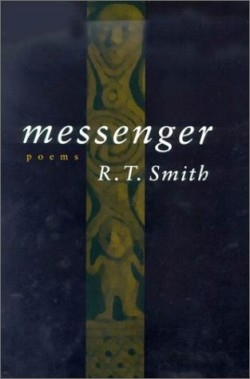
Messenger
With controlled rhythms and a self-reflexive sense of the poet as lyricist, Smith’s eleventh book of poems, Messenger, finds revelation in music.
The book’s first section, Savor of Moss, casts lyrical moments of grace against a backdrop of uncertainty, struggle, and terror loose in the world and concentrated in individual lives. The sweep of emotions at play in the poems is nicely embodied in one of the opening pieces, “North of Spruce Pine.” In it, lightning the poet sees as animating fissures in a roadside cliff becomes a metaphor for the birth of myth. Section two, Human Salt, traces the origin of the poet’s attentiveness to rapture and torment to a mystical-religious upbringing, and the edict young Smith received from a ghostly form: “You must say your life to save it.” Finally, in section three the book arrives in Ireland, the primal ground of myth-making and the modern ground of myth-breaking, where war and political struggle “kills the music of harbor and hearth.”
Messenger establishes early that, for Smith, it is the music of the animal world more than the music of humankind that embeds the possibility for grace. Whether recounting the lost voice of a dying deer, or a rhapsody created by a swarm of bees, or a sparrow’s song flourishing amongst deadbolts and hammers in Lowe’s hardware store, these poems are pastorals for the end of the century, tinged with the bittersweet presence of the postmodern. The sound of a cricket “sawing / a cradle and a coffin” allegorizes the aborted beginnings of modern history in “Scribe,” while “Madeleine Sotto Voce” (of Poe’s Ushers) speaks from her crypt, a clear voice that “annihilate[s] all narrative” as it rises from the dank, incestual atmosphere.
This deliverance song makes Messenger a melancholic collection of poems. Smith’s desire is to “sing the litany / beyond language” but the poet’s function, the book implies, is to record the notes as the score moves along, marking tracks for others to follow. “Audubon’s Cardinal,” a poem that captures the naturalist brooding over his failure to resurrect a dead bird through life-like illustration, brilliantly allegorizes the burden of the poet, who, like the naturalist, has one ambition, “to catch / a song in three dimensions”—insinuation, color, line. Tennyson said, “We murder to dissect.” Messenger seems to say, poets make little deaths with each of their verbal dissections.
Smith’s poems are suffused with the kind of self-torture allegorized by the portrait of Audubon, as though in some great chain of beingness poets necessarily occupy pergatoria, cognizant of their and the world’s sins but continually replicating them via language. The intensity of this feeling is at once mitigated and enacted by the poems lilting free-verse structure. The controlled stanzas, usually of a consistency in length, sometimes of a syllabic sameness, indicates an immense desire for control and quiet
contemplation. The rhythms of the lines, however, often crackle on page with dense internal rhymes and a good sprinkling of heavy stresses, as in “North of Spruce Pine”: “Not a fossil. Rather, / fissures antlered in rocks / sheer wall at roadside.” The interesting texture of the lines, along with a simplicity and directness of statement, make the poems a pleasure to read outloud, reminding the reader of the power of song.
The book’s three-part structure is mirrored by Smith’s nearly completed trilogy, of which Messenger is the second book. The metaphoric value of the triad is informed by Christianity; such subtle reminders of the presence of religion in these poems adds valency to the personal vocabulary Smith employs. “Cardinal,” for instance, refers to the species of bird throughout the book, but the word also takes on special connotations as the poems progress to criticisms of Catholicism’s blind institutionalization. The deft, indirect way that such words gather a multitude of meanings mitigates the dull, all-too familiar metaphors that circulate in Smith’s work. In particular, the poems’ endings often disappoint with easy sentiments and clichéd code (light equals good, dark equals bad).
This book sustains an attractive confidence in voice and an earnestness in purpose through to the end, giving Messenger a lasting appeal. There is something gutsy about a book of poems that takes as its end James Joyce’s “The Dead,” paraphrased as: lust, absolution, and all.
Reviewed by
Aimee Houser
Disclosure: This article is not an endorsement, but a review. The publisher of this book provided free copies of the book to have their book reviewed by a professional reviewer. No fee was paid by the publisher for this review. Foreword Reviews only recommends books that we love. Foreword Magazine, Inc. is disclosing this in accordance with the Federal Trade Commission’s 16 CFR, Part 255.
